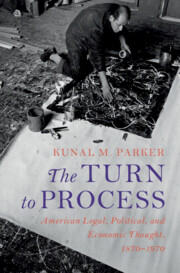
- Publisher:
- Cambridge University Press
- Online publication date:
- November 2023
- Print publication year:
- 2023
- Online ISBN:
- 9781009335256
- Subjects:
- Legal History, US Law, Law, History, Twentieth Century American History

In The Turn to Process, Kunal M. Parker explores the massive reorientation of American legal, political, and economic thinking between 1870 and 1970. Over this period, American conceptions of law, democracy, and markets went from being oriented around truths, ends, and foundations to being oriented around methods, processes, and techniques. No longer viewed as founded in justice and morality, law became a way of doing things centered around legal procedure. Shedding its foundations in the 'people,' democracy became a technique of governance consisting of an endless process of interacting groups. Liberating themselves from the truths of labor, markets and market actors became intellectual and political techniques without necessary grounding in the reality of human behavior. Contrasting nineteenth and twentieth century legal, political, and economic thought, this book situates this transformation in the philosophical crisis of modernism and the rise of the administrative state.
‘Ranging widely across disciplines, crossing political boundaries, and unsettling conventional wisdom at every turn, The Turn to Process provides a brilliant new synthesis of a transformative period in American intellectual life.’
Angus Burgin - Johns Hopkins University
‘This book is a real tour de force, a return to intellectual history in the grand manner. In Kunal Parker’s synthesis, the leading theorists of law, political science, and economics in the twentieth century all contributed to, and followed, a shift away from theorizing their sciences as means to substantive ends such as justice or morality, to thinking about them only as methods or procedures. The book is marked by deep learning in the sources of all three fields and an uncommon lucidity in exposition.’
Robert W. Gordon - author of Taming the Past: Essays on Law in History and History in Law
‘In this revelatory account of ‘a world rendered process’, Kunal Parker brilliantly reframes the history of modern American knowledge-making. As foundational certainties faltered in the late nineteenth century, he contends, the language of tools, methods, and techniques remade entire disciplines and professions - with enduring consequences for how we understand law, democracy, and markets.’
Sarah Igo - author of The Known Citizen: A History of Privacy in Modern America
‘In this brilliant book, Kunal Parker examines the causes and consequences of this ’turn to process' in political science, economics, and the law. Parker’s findings will be of great interest to scholars of US intellectual history, the history of science, and social theory.’
Joel Isaac - The University of Chicago
‘Among many achievements, Parker’s book is an incisive and essential history of how today’s fields consolidated around their contemporary focus on method. In this way it is not only a striking and synthetic interpretation of the mid-twentieth century intellectual world. It is also a powerful account of the extent to which even as the driving methods of that era - for instance, the legal process school in law - collapsed, greater space for plural methods nonetheless continues to go hand in hand with the dominance of method itself as the basic source of scholarly authority.’
Aziz Rana Source: Balkinization Blog
‘In a world of earnest but inevitably middling scholarship, Kunal Parker has written a book worth writing, one that is worthy of the effort, redemptive of the genre, and rejuvenating for even the most jaded of weary readers.’
John Fabian Witt Source: Balkinization Blog
‘Kunal Parker has completed a stunning and sweeping history of how a certain segment of American legal, political, and economic thinkers reoriented their respective fields away from stable notions of “truths, ends, and foundations” toward dynamic “methods, techniques, and processes.” In doing so, he makes several contributions to the existing literature by complementing and at times challenging some of the most canonical works in American intellectual history, especially by uncovering the multiple meanings of “the turn to process” and by re-periodizing our conventional understanding of this otherwise familiar story about change over time.’
Ajay K. Mehrotra Source: Balkinization Blog
‘This work is a sweeping intellectual history of great ambition. Spanning the period between 1870 and 1970, the book draws on a remarkable depth of erudition to argue that American thought leaders across the domains of law, politics, and economics responded to the challenges of modernism by embracing methods, procedures, and processes. By converting substantive truths into procedural techniques, these scholars were able to establish forms of disciplinary authority that were immune to the corrosive effects of the modernist predilection for subjecting truth to historical and psychological critique. Grand in scope, Parker’s book also shines in its illuminating close readings, which bring to light the surprising parallels between seemingly quite distinct textual traditions. In all these respects, The Turn to Process is an important contribution that promises significantly to reshape the boundaries of scholarly debate across a range of disciplines.’
Amalia D. Kessler Source: Balkinization
 Loading metrics...
Loading metrics...
* Views captured on Cambridge Core between #date#. This data will be updated every 24 hours.
Usage data cannot currently be displayed.